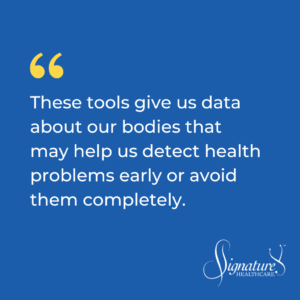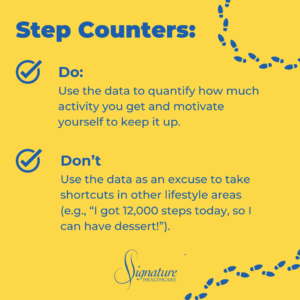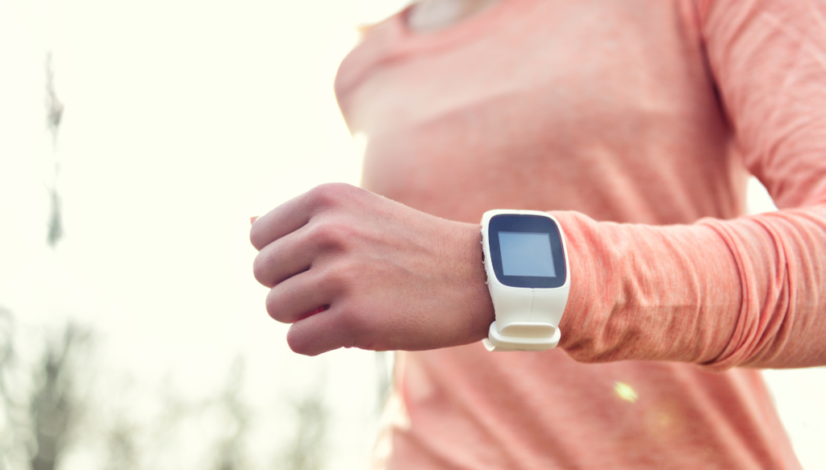Wearables to Track Personal Health: Here’s What We’re Watching
Wearable tech has a cool factor, particularly in its potential to advance patient health.
As people become more cognizant of their wellness and fitness, a galaxy of wearable trackers has become available. These tools give us data about our bodies that may help us detect health problems early or avoid them completely.
In fact, sometime in the not-too-distant future, we’ll likely all wear simple trackers that monitor variations in our vital signs.

At Signature Healthcare, we’re watching a few favorites that our patients and doctors have tried and recommended:
Heart Rhythm Trackers
Apple Watch
Many patients monitor their hearts in real time using an Apple Watch, the world’s most popular wearable. The watch picks up abnormal heart rhythms, and a Stanford University study confirms that it accurately detects atrial fibrillation (AFib) in patients.
At the press of a button, an Apple Watch user generates a real-time heart rhythm strip. When patients show us their strip, we occasionally see early indicators of AFib. It’s a valuable hint to do further testing: If undiagnosed, AFib can cause strokes, heart failure, and other problems.
Newer Apple Watches and other devices also detect falls in elderly patients and let them call for help if they can’t reach a phone.
KardiaMobile Card
Although technically not worn on the body, patients can keep the KardiaMobile Card at home or carry it in a wallet or pocket.
If they feel something abnormal in their chest, they place their fingers or thumbs on the credit card-sized device. It records an EKG they can send me for review, and if necessary, we’ll test further in the clinic.
Sleep Trackers
Struggles with insomnia frustrate some patients in my daily practice. Individuals who have trouble falling asleep, or who wake too early and can’t resume sleep, want to improve their slumber’s length and quality.
Useful sleep-tracking devices include WHOOP, Oura Ring, Fitbit, Garmin watches (which all track a number of other personal variables, too), and Empower, an advanced sleep tracker.
I used a Fitbit to monitor my sleep score during a fitness challenge and found it delivered good basic data. Here’s my take on a few of the others:
WHOOP
WHOOP delivers interesting insights, even advising you when to take a break from exercise. Plus, you can charge it while wearing it.
Oura Ring
Studies find the Oura Ring accurate at sensing when you’re sleeping vs. awake, although it’s not as specific about what sleep stage you’re in. My patients also report helpful results regarding their mobility and body temperature while asleep.
Empower
Several doctors at Signature Healthcare have tried the Empower wearable sleep device, which goes beyond the Oura Ring and other ring devices. Empower tests for sleep apnea and indicates whether you’re at high risk or perhaps already have it. Empower experts review your data with you, advise you on your results, and recommend whether you need a CPAP machine or further testing.
With the exception of the Empower device, we don’t diagnose sleep apnea solely based on results from one of these devices. We’ll often ask that patients participate in sleep labs or even home sleep studies using additional equipment. With further testing, we can treat not just sleep apnea but also hypertension and other conditions that may accompany it.
Blood Pressure Monitors
In Europe, a light bracelet known as Aktiia measures blood pressure continuously and noninvasively through the skin.
For individuals who want to monitor their own blood pressure, Aktiia is a step up over periodically squeezing your upper arm with a heavy cuff (although Aktiia offers that type of monitor, too).
Aktiia is not yet approved for use in the U.S., but we’re confident this type of device will be.
Glucose Monitors
Continuous glucose monitors (CGMs) help patients with diabetes monitor their blood sugar. These small devices, like Dexcom, help newly diagnosed diabetics understand what drives their blood sugars upward. One patient’s wearable CGM showed that his daily fruit and yogurt intake caused his sugars to spike — a very helpful insight!
However, I hesitate to recommend CGMs to health-conscious non-diabetics who want to continually track blood sugar. We shouldn’t aim to keep blood sugars at a low threshold all the time. That’s not how our bodies typically process carbohydrates and sugar.
Too-frequent monitoring can cause nutritional missteps. For example, an individual obsessively focused on keeping sugar levels low may miss out on essential nutrients from healthy carbohydrates or may overconsume other types of foods to deleterious effect.
Wearables Don’t Replace a Visit to Your Doctor
Wearables indicate that something — your heart rate, blood pressure, sleep patterns, etc. — needs attention. But they don’t provide definitive diagnoses.
That doesn’t mean data from wearables isn’t valuable or usable. If your Apple Watch alerts you to a strange heart rhythm, it’s a reason to come to the clinic immediately. We’re more likely to catch AFib if we apply the gold standard test, a full 12-lead EKG, as quickly as possible.
Heart rhythm varies with AFib, so an EKG may not detect it immediately. But the Apple Watch alert has encouraged us to be vigilant. I may also prescribe wearable tech to monitor your rhythms continuously, but we’ll still do follow-up testing to look for clear indicators.
Similarly, if a patient brings me Oura Ring results and says, “Look at all the wakeups I had!” it prompts me to test for actual sleep issues.
A Few More Things to Watch
Heart Rate Variability (HRV)
Some individuals, especially athletic ones, are interested in measuring their heart rate variability (HRV). The belief is that the higher your HRV, the better your physical conditioning. HRV differs from person to person. Someone’s high HRV may be due to medical reasons rather than good cardiovascular fitness.
I am still looking for studies that incorporate this into clinical use. Currently, HRV isn’t a vital sign we measure in-clinic. But as we get more data from wearables, it could become a new vital sign or predictor.
Pulse Oximetry
Some wearable tech measures the percentage of oxygen in red blood cells through pulse oximetry. At the height of the COVID pandemic, we encouraged patients with the virus to periodically measure their oxygen capacity and contact our office if it dropped below 90% before shortness of breath began.
Most pulse oximeters also track heart rate, which is useful if it suddenly increases rapidly.

Step Counters
Devices with a step-counter feature determine how many steps you take in your typical routine around home and office, whether you walk for a half-hour or run a few miles daily.
Most step counters track some level of activity, which can be a great way to monitor yourself:
- Do use the data to quantify how much activity you get and motivate yourself to keep it up.
- Don’t use the data as an excuse to take shortcuts in other lifestyle areas (e.g., “I got 12,000 steps today, so I can have dessert!”).
Getting more activity is great, but make sure that some of that activity is dedicated exercise.
Got Questions About Wearable Tech?
We’ve got answers! At Signature Healthcare, our team monitors all types of personal health trackers.
Check in with us for advice on health tech that suits your lifestyle or to hear about great new developments that may support your health needs. I look forward to the chat!

Dr. David Yancey
Dr. Yancey, a board-certified internal medicine specialist, hails from Winston-Salem and holds a psychology degree from Davidson College. He furthered his medical education at The Brody School of Medicine at East Carolina and completed his internal medicine residency at the prestigious Mayo Clinic. Returning to North Carolina in 2010, Dr. Yancey has since been a dedicated hospitalist physician at Carolinas Medical Center in Charlotte. There, he has spearheaded various multi-disciplinary rounding programs and contributed to the training of PA and nurse practitioner fellows.
Outside of his professional pursuits, Dr. Yancey is an avid enthusiast of the great outdoors, enjoying trail running and hiking with his dog. He also relishes traveling, cooking, and assembling jigsaw puzzles with his family.
Get the latest News
Join the Signature Healthcare Newsletter to get the latest articles, resources, and news delivered directly to your inbox.

